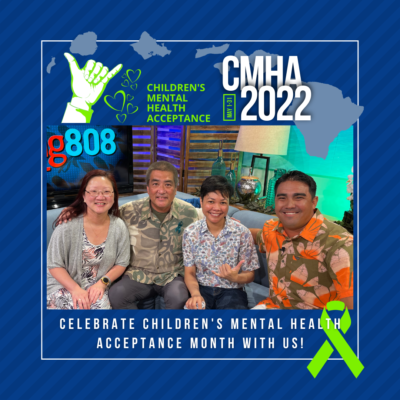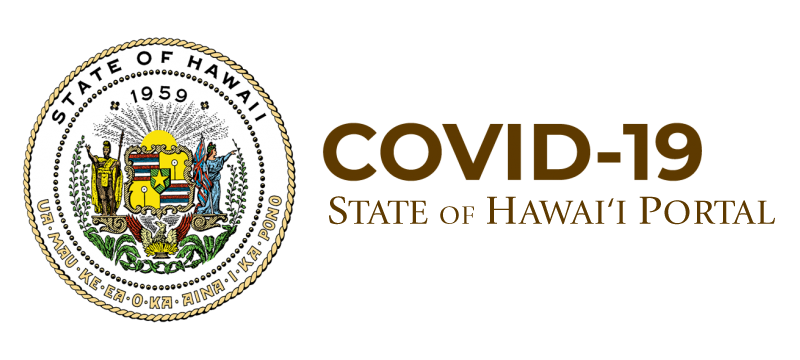The U.S. Surgeon General issued an advisory in December 2021 highlighting the urgent need to address our nation’s ongoing youth mental health crisis which has been significantly expanded by the COVID-19 pandemic.
Dr. Scott Shimabukuro, acting administrator for the Hawai‘i Department of Health’s Child & Adolescent Mental Health Division (CAMHD), said children in Hawai‘i have suffered from the stress and isolation imposed on them during the pandemic and now need supportive families and medical resources to help them recover.
“For our kids to bounce back and thrive, families need to demonstrate the ability to appropriately express emotions with each other; the negative as well as warmth and love. And parents need to model problem-solving, self-regulation, and have the ability to listen,” said Dr. Shimabukuro.
The Surgeon General’s advisory stresses the urgency of a new Children’s Mental Health Acceptance (CMHA) campaign message – that it’s time to move beyond awareness and into acceptance – for several reasons.
- To accept that 1 in 5 youth experiences a mental health challenge
- To accept that mental health challenges must be met with understanding and support
- To accept that bias and discrimination toward individuals who experience mental health challenges creates a barrier to seeking treatment – and it must be eliminated
- To accept that our youth are facing serious challenges ahead that need to be addressed
- To accept that the future wellbeing of our country depends on how we support and invest in the next generation
Individuals are encouraged to wear green in May as a show of support and recognition of Children’s Mental Health Acceptance. Green is the national color of mental health, representing acceptance, hope, strength, support, and encouragement for people who struggle with mental illness.
CAMHD has initiated a Children’s Mental Health Acceptance campaign and asks participants to share on their social media accounts how they take care of their mental health. The posts and entries submitted each week will enter the participants into drawings for cool prizes! For more information about the social media challenge and to view the calendar of statewide events visit health.hawaii.gov/camhd/cmha22.
Dr. Shimabukuro, CAMHD’s Medical Director Dr. Kurt Humphrey, Chief Psychologist Dr. Jamie Hernandez-Armstrong and Evaluation Specialist Dr. David Jackson provided answers for some important questions for parents that are concerned about the mental health effects of the pandemic on their children.
How did the coronavirus pandemic increase mental health issues in children?
The COVID-19 pandemic challenged the social, emotional, and mental well-being of youth globally. It is estimated that the prevalence of depression and anxiety have doubled during the pandemic.
The 2020 data estimates that 11,000 of Hawaiʻi’s youth experienced at least one major depressive episode in the prior year. Of those who experienced a major depressive episode, approximately 6,000 did not receive mental health services in the prior year.
In addition, parental stress stemming from homeschooling and financial insecurity may negatively affect children as well. While most parents do not believe their stress affects their kids, most kids when asked say it does. Our youth and families need to continue talking about their mental health now more than ever. Our youth benefit when access to resources is timely and services are family-driven, youth-guided, and culturally appropriate.
What are the signs of mental health issues in children?
Looking for changes in behavior is important. This can be changes in the amount of sleep (too much or too little), eating habits (too much or too little), and not doing things that they used to enjoy (being with friends, hobbies, etc.). Youth might become more withdrawn and isolated, or maybe more reactive and irritable. Youth may talk about feeling hopeless, feeling like a burden, or not wanting to be here.
The most obvious sign would be talking about wanting to die or looking for ways to harm themselves. Other factors need to be considered as not all changes are due to emotional distress. There may be some physical health concerns that affect mood and behaviors. Or even habits can change behavior. For example, a child may not be getting enough sleep because they lay in bed looking at their phone. This could then affect the next day’s school performance as well as their mood. But noticing these differences is a starting point.
What should a parent do if they think their child may need mental health support?
Your pediatrician may have a recommendation. Additionally, schools can offer different counseling support for struggling youth. Students or supportive adults can ask the school about counseling services.
There are also many well-qualified private providers for individual and family therapy. People can check with their insurance about which providers are covered by their insurance. Youth and families can also reach out to friends and family in the community for support.
CAMHD provides mental health services free of charge for eligible children and youth ages 3-20 who have severe emotional and/or behavioral challenges. CAMHD can provide services to youth ages 14 and up that request services on their own. There are also some free groups including groups for teens and a parenting group. More information about groups and a referral for CAMHD services are available on our website.
Many other free mental health resources are available to Hawai‘i’s children, youth, and families through Help Your Keiki and Mental Health America of Hawai’i. The National Federation of Families for Children’s Mental Health also offers resources and activities to help families get involved throughout National Children’s Mental Health Acceptance Month in May.
Hawai‘i residents may call Hawai‘i CARES at 1 (800) 753-6879 for mental health crisis intervention, as well as substance use support. A Hawai‘i CARES worker will help determine available support and send a crisis worker to the caller if needed.
Youth more comfortable texting can use the national Crisis Text Line by texting ALOHA to 741741. Texting this number will give a person access to a trained Crisis Counselor.
Denby Fawcett: Why So Few People Are Getting The New Covid Shot
Experts are worried about the lack of interest as people are still suffering from the virus and long Covid. By Denby Fawcett Original article on Civil Beat, November 7, 2023 I keep a card in my [...]
Federal Public Health Emergency (PHE) for COVID-19 ends on May 11, 2023
HONOLULU, HI –The federal Public Health Emergency (PHE) for COVID-19, declared under Section 319 of the Public Health Service Act, will expire at the end of the day on May 11, 2023. As the PHE [...]
Seniors now eligible for additional COVID-19 bivalent booster dose, COVID vaccine recommendations simplified
HONOLULU, HI – The Hawai‘i Department of Health (DOH) supports the latest recommendations announced yesterday by the Centers for Disease Control and Prevention (CDC), allowing an additional dose of the bivalent booster against the virus [...]
Hawai‘i COVID-19 hospitalizations on the rise
HONOLULU, HI – The Hawai‘i Department of Health (DOH) reports a rise in the rate of COVID-19 hospitalizations. The number of total positive COVID-19 hospitalizations has increased over the past week (3/26 – 4/4) from [...]
Wastewater Samples Show Higher COVID Concentrations & New Subvariant
The Hawai‘i State Department of Health’s most recent Wastewater Surveillance Report documents two significant developments about COVID-19 in Hawai‛i. Higher concentrations of the virus that causes COVID-19 The arrival of the XBB.1.5 subvariant Higher concentrations [...]
Bivalent boosters for keiki as young as 6 months
Updated COVID-19 bivalent boosters are now available in all counties for keiki as young as six months of age. The U.S. Food and Drug Administration (FDA) amended the emergency use authorization for the bivalent boosters [...]
